.
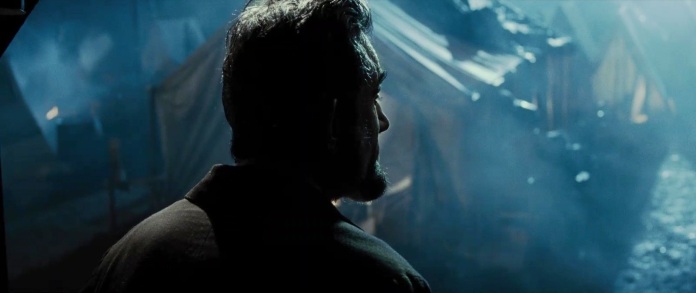
.
Director: Steven Spielberg
Screenwriter: Tony Kushner
By Roderick Heath
Lincoln’s opening shots depict warfare: writhing bodies in primordial mud, flesh punctured by bayonets, and mouths yawing in screams of pain and murderous passion. White Confederate soldiers and black Union soldiers are engaged in war as primal and terrifying as anything out of Homer, evoking not merely the awesome violence of the American Civil War in general, but of war itself. Here is the threatening spectre of apocalyptic racial blood feuds, too, uncontained by nominal loyalties to uniforms and factions beyond skin colour. Director Steven Spielberg’s gambit here clearly evokes some of his career’s many scenes of brutal conflict: this charnel-house vision is grimly realistic in its squirming, thrashing, intimate corporeal violence, and yet also distinctly stylised, bordering on abstract, in its depiction of clashing bodies and frenzied motion, a reductio ad absurdum of humanity in the very pit of self-willed dehumanisation.
.
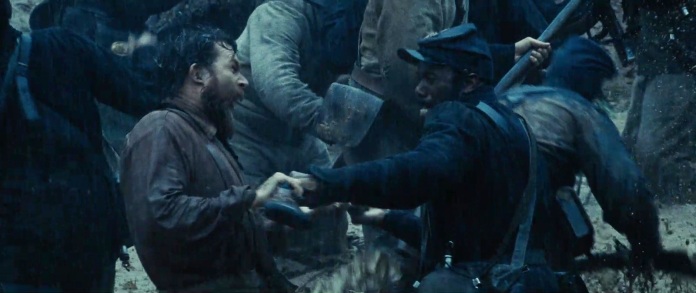
.
In such a moment men are not men, but rather bundles of desperate, murderous/survivalist impulse. Such dehumanisation is to be the stake of the story, but of a different kind, that is, the condition of the slave rather than the soldier, although these states are linked in many ways. The stylised quality continues in the subsequent scene at an army staging post, as columns of soldiers being deployed march past President Abraham Lincoln (Daniel Day-Lewis) to another terrible, but possibly climactic, campaign. This is a churning cauldron of rain, squelching mud, filthy and sodden men, eerie light and shadow, the president backlit, half iconic, half ogrish, attempting to interact with patient politeness with the men. Lincoln listens to the testimony of two black soldiers (Colman Domingo and David Oyelowo), who are veterans of such internecine slaughter. One recounts his experiences, and the other tries to lobby for better treatment, pay, and advancement, looking forward already to the painfully slow crawl toward the epiphanies of the mid-20th century. Lincoln listens with polite rectitude, as he will continue to do through most of the following narrative, resisting outright declarations and positions until he has made up his mind and knows that his displays will carry weight.
.
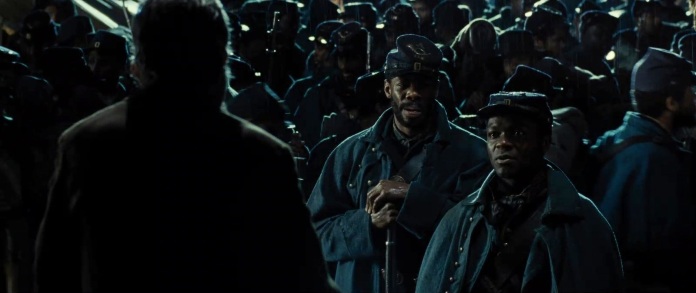
.
The mood here is similar to the climactic scene of Spielberg’s previous drama, War Horse (2011), with a similar purpose, albeit with different inflections: where that film was mythic and romantic in its approach to a cruel historical milieu, this is quite different, but still sustaining that film’s sense of hovering on the edge of a dream memory. Spielberg imbues the soldiers’ camp with an appropriately bustling realism, but also somehow suggests a more ethereal, spiritual, elemental drama in the offing. This scene signals a nexus of testimonial artefact, historical tableau, and Brechtian drama, underscored when some of the white soldiers (Lukas Haas and Dane DeHaan) attempt to recall the words of the Gettysburg Address, delivered in halting and stilted terms, whereas one of the black soldiers recalls it verbatim and with a certain poetic flare whilst walking off into the shadows, transmuted from immediate presence to an almost elemental voice, the scene suddenly empty except for Lincoln. The specific impact of Lincoln’s most famous speech is reflected back to the man himself, via the people to whom it was a missive of mourning and also a promissory note, a hope of a restoration of moral order and centrifugal reason to an age of wild slaughter.
.

.
This scene is a clear declaration from Spielberg and screenwriter Tony Kushner that what follows is a hindsight study, full of after-the-fact epiphanies and perspectives, an evocation of the inevitable gap between us and Lincoln, and between the man and his own works and words, rather than a documentary. It’s a necessary declaration, particularly as Lincoln soon devotes itself to a specificity occasionally redolent of political journalism, depicting the minutiae by which Lincoln and his “team of rivals” (per Doris Kearns Goodwin’s source history) achieved their last and greatest political coup against a backdrop of epochal brutality and moral compromise. Lincoln is as panoramic as it is biographical. Here is the Union’s political universe, the landscape of a society at war, a complex system of interrelated personages, institutions, ideals, and necessities. Lincoln’s recent reelection has empowered him to take bold actions to win the war and also find its essential purpose and meaning. The air of hallucination from the opening continues even as a more domestic, intimate note is struck, as the scene shifts to the White House, where Lincoln recounts a stark and distressing dream of riding headlong into calamity aboard a strange vessel (actually a stylised Monitor warship). His wife Mary (Sally Field) interprets the dream as his anxiety over an upcoming military assault, but then realises it actually portends his need to pass the slavery-abolishing 13th Amendment.
.

.
Lincoln makes his desire clear to his Secretary of State, William Seward (a particularly cagey David Strathairn). Lincoln illustrates the spur for his determination to get the Senate-approved amendment passed in the House of Representatives by turning a petitioning interview with a petty-minded landowner and his wife (Bill Camp and Elizabeth Marvel) into a quorum on the abolition question. The couple tacitly supports it as a war measure, but finds the idea objectionable if peace were to come out of fear of an imagined horde of larcenous ex-slaves on the loose. Lincoln thus argues to Seward they need to get the amendment passed before Republicans elected on Lincoln’s coattails are swept into Congress, because the war could be over by then. Seward agrees to help but feels Lincoln should stay out of the murky activity this demands, as many Democrats sacked by their constituencies can be inspired to vote for the amendment with the promise of mid-level bureaucratic jobs and other semi-corrupt devices. To this end Seward puts together a team of operators, Bilbo (James Spader), Latham (John Hawkes), and Schell (Tim Blake Nelson), who begin working on the lame ducks.
.

.
Lincoln, in its subject matter and aspects of its approach, is definable as Spielberg’s follow-up to his antislavery epic Amistad (1997). But whereas the earlier film was rendered as a kind of visual-dramatic operetta, Lincoln is superficially cooler in style, offering character portraiture intertwined with a procedural take on political manoeuvring in the context of a particular society’s most crucial moment of redirection. Amistad depicted the process by which the slow asphyxiation of that primordial American sin, slavery, began, by both direct and violent action and legal minutiae and cultural reconstruction; Lincoln takes up the culmination. Spielberg’s instincts as a cinema artist and a practised, “mainstream” entertainer have often noticeably clashed in his films, but here they work in perfect tandem. Dashes of low comedy, even slapstick, graze against high-flown orotundity, grand carnage, bruising domestic tumult, and purposeful theatre of righteousness, all with a Shakespearean sense of interconnectivity, traced to common roots, a clash of essences enacted on every scale from the most intimately personal to the pan-national.
.

.
Lincoln’s depiction of the disparity between solemn institutional responsibility and the vulgar, lively, often absurd nature of communal life, has roots in Spielberg’s early films—The Sugarland Express (1974), Jaws (1975), 1941 (1979)—in which a carnival-like Americana was evoked with a craft similar to, if less cynical and purposeful than, Robert Altman’s. The film justifies its title in its concept of Abe Lincoln not merely as an icon of the era, but as its fulcrum, the man on whose face and, ultimately, whose very mortality, the struggle’s course is written. And yet in the course of the film’s narrative, Lincoln himself is often sidelined for stretches of running time, waiting for results of actions he’s set in motion, at once removed from them and yet feeling their abstract import all the more keenly as a result. It is this sense of moral culpability as well as virtue that Spielberg and Kushner look to as the measure of worthiness; a genuine engagement with the problems of human worth becomes a right and proper yardstick for determining that worth.
.
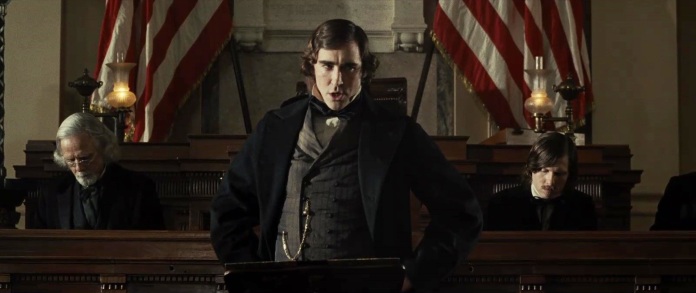
.
Everyone is judged by this maxim, from Lincoln himself, who is all too aware that his labours are often on some level at cross-purposes, wielding violence and subterfuge to secure the liberty of one sector of the populace at some expense to another, to anti-abolitionists who subordinate humanistic concerns to those of sectarian interest. These are represented in the film by the “copperhead” Fernando Wood (Lee Pace) and George Pendleton (Peter McRobbie), who attempt to forestall the abolition bill for various myopic reasons that masquerade as matters immediate, overriding, and pragmatic. Spielberg avoids repeating himself in regards to Amistad, because he can take it for granted that he’s already portrayed the immediate horrors of the slave’s condition.
.
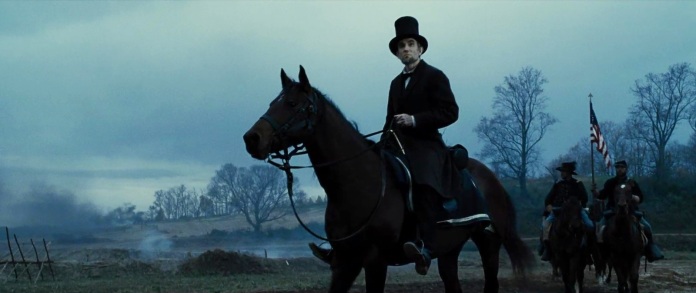
.
Spielberg has big shoes to fill here, even by his standards; Honest Abe’s stature as the most iconic and admired American President in history has inspired some hefty artworks over the years, including John Ford’s Young Mr. Lincoln (1939), which depicted Lincoln’s evolution from frontier whelp to canny lawyer whose meandering folksiness conceals a stiletto-like sense of purpose. Ford’s film is also about the world around Lincoln. Spielberg and Kushner’s Lincoln, on the other hand, is trapped within a more elevated but no less tumultuous community, that of high democratic politics. Whilst waging a war that calls into question every presumed bond, ideal, and motive in the nation Lincoln leads, he attempts to lay down its greatest claim for future self-respect.
.

.
Lincoln’s specific heft is saved for negotiating with two major political figures who stand as nominal partners, but who could also choke his efforts if they choose. The first is Preston Blair (Hal Holbrook), Republican Party cofounder, a pure-bred optimate who claims to have founded a “conservative anti-slavery party”: Blair agrees to aid the bill but only on condition Lincoln lets him try to initiate peace negotiations with the Confederates. At the other extreme is Thaddeus Stevens (Tommy Lee Jones), leader of radical Republicans, set on imposing a punitively righteous reckoning on the remnants of slave power and whose cabal in Congress regards Lincoln as a prevaricating sell-out. Lincoln must tread the torturously narrow trail between the two camps. He agrees to Blair’s project and, surprisingly and problematically, it bears fruit: a team of negotiators led by Confederate Vice President Alexander Stephens (Jackie Earle Haley) starts north for Washington. Lincoln is faced by an immediate crisis of conscience, albeit only a newly sharpened version of the one he’s been wrestling with for four years, as he must choose between negotiating an end to the murderous war but possibly ruin the cause for many believe it has been waged. Meanwhile, as Bilbo and his team work, they manage to sway a large number of their targets, but finally come up against insurmountable barriers.
.
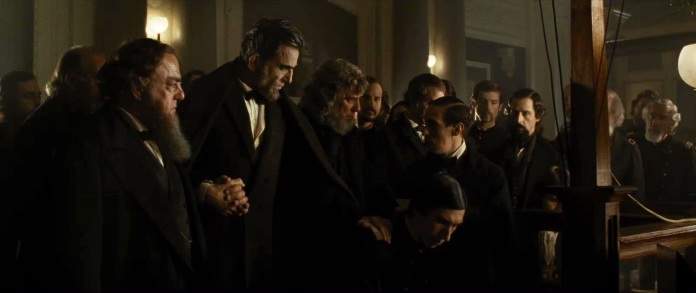
.
Lincoln’s constant frustration with his businesslike War Secretary Stanton (Bruce McGill) during a Cabinet meeting sees his jokey non sequiturs segue into a lengthy exposition of the lawyerly skill and intellectual heft Lincoln is used to wielding not in frontal charges, but in sneak attacks, against positions as various as proletariat obtuseness and aristocratic pomposity. He outlines the seemingly impossibly tangled thicket of dilemmas and self-contradictions involved in his Emancipation Proclamation, an edict that theoretically could be reversed, and therefore his desire to see it backed up by constitutional amendment. It’s a hypnotic piece of actor’s linguistic legerdemain and screenwriting, with Spielberg, via Janusz Kaminski, executing a creeping dolly move towards Day-Lewis like with unblinking attention.
.

.
The scene is all the better for the concision with which it aids not merely an understanding of the issues at stake, encapsulated with rapid-fire yet entirely coherent intensity by Lincoln, but also characterisation. The Lincoln who got himself elected to the highest position in the land suddenly reveals himself as well as the even more elusive one, the agonised moralist and thinker. Spielberg’s empathy with Lincoln could well be described as that of one communicator who knows well enough to coat ugly truths in sweeter flavours for another. Lincoln’s “folksiness” is consistently revealed not just as his way of buttering up people, but also of disarming them, making them underestimate him, of clearing space and shifting the style and intent of attention turned upon him. Later, Lincoln purposefully distracts his colleagues and military staff as they wait for news of the attack on Wilmington with a jokey anecdote harkening back to the Revolutionary War and its easy patriotic associations that stand in contrast to the somehow more painful immediacy of civil slaughter. Stanton, irritated beyond measure by another story, stomps out whilst the President rambles on, only to come back and grip Lincoln’s hand as news comes in.
.

.
War is only glimpsed at the very start of Lincoln, but it is manifest throughout the film, working as a slow poison that infects everything. This is made apparent on an ontological level, but described most tellingly in Lincoln’s home life, in barely dampened turmoil since the death of the Lincolns’ third son. His youngest son Tad (Gulliver McGrath) has taken to wearing a uniform. He likes to lull himself to sleep studying Alexander Gardner’s photos of freed slaves, obsessing over their ragged desperation like many a morbidly conscientious youth of Spielberg’s generation (and after) fixatedly rereading Anne Frank’s diary. The White House is at once home and bunker, jail and mill for the Lincolns, a warren of light and dark, cosy nooks and painfully cramped spaces for nation-administrating labour.
.
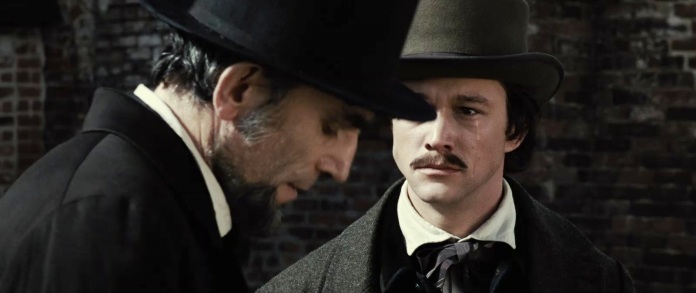
.
Lincoln’s scenes with Tad call to mind irresistibly the father-son moments of Jaws, linked in the portrait of the paternal figure as an assailed, troubled figure in whom real authority and civil responsibility is invested, still keeping a grasp on his family life as a way to stay sane, but the sons also mimic his stance and reflect his own attitudes back at him with painful/beguiling acuity. The intelligent but unbalanced Mary lives in mortal fear of losing her eldest boy Robert (Joseph Gordon Leavitt), who’s been studying law but desperately wants to join up before the war ends for the sake of social and personal approval. Mary dreads the possibility of his death so intensely that even the promise of a cushy staff position can’t mollify her. Lincoln tries to give Robert a sobering experience by taking him to tour a hospital full of wounded soldiers: Robert demurs, but, following a blood-leaking cart hauled by orderlies with curiosity, he’s revolted by what proves to be its load of amputated limbs. But Robert is still not dissuaded.
.

.
One of the best, most realistically, penetratingly human scenes Spielberg’s ever filmed has Lincoln reduced almost to a wraith cowering in the window bay, accepting Mary’s wrath for failing to dissuade Robert until she attacks him for a lack of feeling, whereupon he finally reacts with the indignation of a man who had to bury his grief because he had to remain functional for his job. Field’s brilliance as Mary lies in how she suggests both Mary’s aggravating pathos, which has a showy, demonstrative quality, but also her frustrated intelligence and scathing verbal force. Such force is exhibited when, confronted by Stevens and his followers when Abe holds a White House gathering to court necessary support for the bill, she quietly and mercilessly rips Steven apart for his parsimonious interest in her efforts to decorate the presidential mansion. At such a moment, it’s clear both why Abe married her and also what she might have been in a different time, and also why she’s like sweating dynamite now. Mary finally sums herself up, perhaps a tad too neatly, but with apt self-awareness, as the necessary counterbalance to her husband’s heroic stature, the face of the gnawing fear and pain of the age.
.

.
A second female figure in Lincoln’s household is Elizabeth Keckley (Gloria Reuben), Mary’s maid and a former slave, whom Tad asks with guileless fascination whether she was whipped. Keckley is the moral barometer, as her face and attitude often silently charts the course of events, feeling on the most immediate level the fear and hope the drama is depicting. Lincoln’s solicitation of her opinion is another fascinating moment, as Keckley asks him bluntly about how he looks personally at the racial problem. Lincoln (and Spielberg and Kushner) attempts to avoid mealy-mouthed piety at the risk of sounding standoffish, explaining his difficulty in assessing the matter because he doesn’t “know” black people with real understanding: “I expect I’ll get used to you,” he says with dry Midwestern humour, as if aware that in trying to regard the problem from Olympian heights, he recognises that common humanity is only ultimately a matter of neighbourliness. But humour only goes so far, as Keckley reminds Lincoln she’s the mother of a fallen soldier, questioning what this makes her for the country if not a citizen worthy of veneration as well as emancipation and tolerance.
.

.
A race against time enters this narrative as Blair semi-wittingly threatens Lincoln’s intentions with his successful entreaty to the Confederates. Their emissaries are ushered across enemy line into the hands of Ulysses S. Grant (Jared Harris), to Union Army reception committee stacked with black soldiers, a seemingly calculated provocation. Grant, determining that the emissaries are serious men, recommends to Lincoln that they be interviewed, leaving Lincoln with a most definite choice, either to stymie the negotiators briefly to help ensure the vote’s passage, or allow the Confederate company to come straight on and possibly end the war. The issue leaves Lincoln a peripatetic insomniac, awakening his assistants in the night by sitting on their beds to discuss pardons for deserters, and finally, hovering on the edge of decision, seeming to discursively explain Euclidian geometry with two signalmen.
.

.
But of course Lincoln is actually considering moral calculus, drawing the lesson that peace and safety for one group cannot be obtained if it means abandoning another group to tyranny, and this informs his last-minute decision to order Grant to delay the emissaries and work on the vote for the bill. When he finally confronts Stephens, his entreaties fall on deaf ears. Spielberg pulls off one his most adroit pieces of editing, cutting to the infernal sight of blazing Richmond, its devastation the implicit result of both Lincoln’s politicking and Confederate intransigence. The images, long since soaked into the folk-memory of the U.S. and the world, of Lincoln’s journey across the pulverised battlefields to Richmond, and Robert E. Lee’s (Christopher Boyer) plaintive return of Grant’s salute after surrender, retain not gallant lustre but a newly bleak sense of the nature of leadership: “We’ve made it possible for each other to do terrible things,” Lincoln tells Grant.
.

.
In this regard, the John Ford film Spielberg’s Lincoln feels kin to is less Young Mr. Lincoln than his sublime Civil War segment for How the West Was Won (1962), where Grant and Sherman argued with palpable personal angst in the midst of carnage. The filmmakers’ relish of Lincoln as a protagonist and his mental alacrity calls to mind A Man for All Seasons (1966), and like that film, it manages to invest history’s saints with living wit and artistic poise. The depth and intensity of this film’s preoccupation with political and personal responsibility is thankfully leavened by counterpointing such weighty matters with Bilbo’s rather less moral, although equally determined, efforts, which include, at one point, his having to fend off a congressman who tries to shoot him. When Lincoln pays a visit to Bilbo, he amiably quotes Henry IV Pt. 1 to him (“We have heard the chimes at midnight, Master Shallow!”), a knowing glance at the Bard’s skill at conflating the business of kingship with that of knaves, and Bilbo’s Falstaffian demeanour sit well with this (a superbly bluff performance from the once wolfishly poised Spader).
.

.
Lincoln’s decision to engage more directly with the vote-reaping process, as it looks like it’s failing, sees him directing his more intricate and psychological gifts at the problem, as appeals to self-interest and the ephemeral pleasure of being seen to do good cannot entirely sway more powerful, if not always more reasoned, emotional and intellectual stances they’ve encountered. William Hutton (David Warshofsky) is touched by hatred for blacks since his brother died in battle for their sake. George Yeaman (the great Michael Stuhlbarg) hates slavery, but fears sudden emancipation might expose the people it’s designed to help to calumny. One thing Spielberg and Kushner get particularly right is the degree to which the era’s political verbiage was as much theatre as message, pitched to the galleries rather than the cameras and to awe journalists into recording them like prophets rather than bewilder them until the news cycle ends. In the film’s broadest scene, as the anti-abolition forces try to bait Stevens, Stevens must muster restraint and linguistic cunning, mixed with raw abuse of his opponents, to survive the moment. He immediately earns the upbraiding of a fellow radical for demurring on the issue of equality, to which Stevens ripostes he’d do anything if it means having ensuring that the only inclusion of the word “slavery” in the constitution is an amendment proscribing it.
.
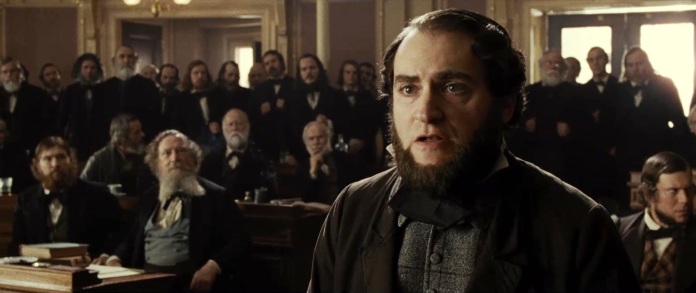
.
Lincoln is, by and large, a study in the fundamental dilemma of democratic government of how to identify and achieve the most good for the most people as a natural extension of the communal will rather than an imposition. The relationship, prickly and peculiar, between Lincoln and Stevens is the film’s ideological engine. When Stevens outlines a plan for post-war punitive legislation to reconstruct the American body politic by replacing Southern oligarchs with empowered free blacks, it’s startling how much force and beauty his plan still has. Lincoln drolly describes this as the “untempered version of Reconstruction,” but interestingly, Stevens, like Lincoln, is a study in human frailty under statuesque heroism, and all the more so literally, forcing himself to stand erect before the Congress when he must bend and shuffle to walk, clad in a dreadful wig to hide his bald pate, hiding his love affair with his mixed-race housekeeper Lydia Smith (S. Epatha Merkerson).
.

.
The ironic reveal of this dalliance fascinatingly confirms the sort of implications aimed at the abolitionists of the era, but Spielberg treats it with delicate good humour, as Lydia welcomes Stevens back from Congress with the bill in his hand, and segues to the politician getting in bed with Lydia and asking her to read the bill out whilst counting off the clauses himself. There’s a reprise of the almost recitatif-inflected opening here, as hallowed political language is again employed, but with the immediate force of its human implications presented in the most unexpected of fashions: the muted tenderness of the couple in bed automatically undercuts the scurrilousness, and instead imbues the film with the first glimpse of peace as a promise after the fractious bitterness and soul-searching.
.

.
The actual vote is a Spielberg set-piece of the first order, albeit with a difference, because, whilst the outcome is known, the tension is still remarkable, with Lincoln in part reduced to audience surrogate as he must wait for the result of the vote. The exact outcome remains in the balance until the crucial cry of “Aye!” escapes Yeaman’s lips, and even the Speaker (Bill Raymond) adds his vote to the balance. Spielberg pulls off a great discursion here as he cuts away from the final tallying to Lincoln in his office, awaiting word, alerted by the pealing of bells to his success, and then cutting back to the eruption of jubilation in the Congress where the dignified politicians rejoice like teenagers at a post-game kegger—a singular and well-earned moment before the reckoning. Part of the thrill here comes from the natural power of seeing great good achieved, and also from the simple release of the film’s weighty mood, as the Representatives whoop and hoist the amendment’s manager James Ashley (David Costabile) in the air, the man himself almost weeping with relieved glee, whilst Stevens, with the silent satisfaction of a man who’s triumphed against time and the world, asks to take the bill home with him.
.

.
If there’s a downside to the muted bravura Spielberg wields throughout this work, as the first drama he’s offered in a long time to gain near-universal acclaim, it is thus; the moments of truly expansive vision glimpsed in the likes of The Color Purple (1985) and Empire of the Sun (1987) are dampened in favour of a more convincingly intimate, but less overwhelmingly pure exuberance in cinema. But Spielberg self-critiqued is still Spielberg, apparent in the authorial deftness of his camera precisely charting dramatic highs and lows, in shots as casually telling as the camera movement that follows Stevens as he strips himself of his worldly regalia and gets into bed with his mistress, or as strikingly odd as the semi-surreal visions of Lincoln’s dreams. Spielberg’s partnership with Kaminski has achieved more spectacular results, but rarely more expressive, and indeed quasi-expressionistic, in a film that uses the dance of light in an either naturally illuminated or candle-and-lantern interior world. There’s a strong suggestion of the influence of Victorian painting in the visual scheme, and a particular debt to Thomas Eakins’ “The Gross Clinic,” with its similar manipulation of source lighting to create a surgeon-hero bathed in the light of reason. A recurring motif of the characters framed in windows, poised between light and dark, hearth and world, sees Lincoln both demonic in his row with Mary, and ethereal, as he draws Tad behind a curtain to look out on the celebrations of the bill.
.

.
It’s peculiar to think of Spielberg, often described as the Peter Pan of American cinema, entering his autumnal phase, but whilst there’s still plentiful verve and control in evidence, the usual tones of a late-career masterpiece are here. Late in the film, Spielberg offers a brief sequence that feels utterly vital, a signature flourish that reveals much: a visit to a theatre, which at first glance is immediately processed by an expectant audience as Ford’s, but proves rather to be one where Tad watches an Arabian Nights arabesque that sees hero save damsel from devilish villain who falls only to release a phoenixlike spirit. There’s an obvious, deliberately naïve quality to this bit, offsetting the agonised dragon-slaying of the historical drama with its most childish, Manichaeistic representation. It is also reminiscent in its brief window of theatrical wonder to the pantomime visit in David Lynch’s The Elephant Man (1980), a moment spared for the mystique of the Victorian theatre and its transformative strangeness, a prelude to the cinema in transfixing spectacle remembered on the hazy horizon of popular culture.
.
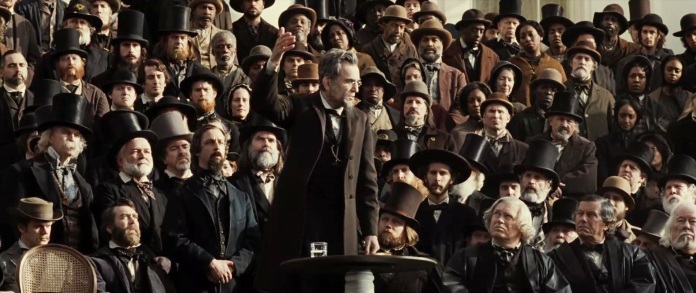
.
There’s also a nod here to Spielberg’s awareness of his own wrestling with the themes of his “serious” films earlier in his career through his equally colourful stylised genre excursions, like the equally Arabian Nights-esque absurdity of Indiana Jones and the Temple of Doom (1984). Here the fantasy illusion is ruptured in the worst possible way, as Lincoln’s assassination is abruptly announced to the theatre, and the horrified Tad begins to scream and scream. Of course, for Spielberg, the nexus of tragedy in Lincoln’s death is found in the fundamental image of an orphaned son, both consummation and defloration of the director’s career concern with paternal care and the child’s wayward path to maturation, and so the film connects history with a gaping hole in the family life. The film’s final moments, lapping back to Lincoln’s second inaugural address, risks lurching at last into the familiar refrains of the historical pageant, but manages to capture the vibrating question and threat in Lincoln’s words, still echoing 150 years later.

“Spielberg has big shoes to fill here, even by his standards; Honest Abe’s stature as the most iconic and admired American President in history has inspired some hefty artworks over the years, including John Ford’s Young Mr. Lincoln (1939), which depicted Lincoln’s evolution from frontier whelp to canny lawyer whose meandering folksiness conceals a stiletto-like sense of purpose. ”
Indeed Rod. Well, you have voiced some rather minor issues in this incomparably sprawling essay on this monumental work in the director’s canon, and a film well regarded by audiences, historians and the critical establishment (though it appears the Oscar voters are in the process of deserting the film for the likes of ARGO! Ha!) For me it is the best LINCOLN film we have had at the movies to this point, surpassing Ford’s film, and ABE LINCOLN IN ILLINOIS. It’s interesting that a vociferous minority is complaining that the film is didactic, when in fact these very same people have always complained that the iconic director has never failed to open the flood gates. By allowing Tony Kushner and the great Day-Lewis to take charge he has allowed this seminal event in U.S. history coverage from all angles, and there are even some political machinations here that are new even to the ardent Lincoln and Civil War buff. Abe is my favorite President (and as you note Rod, he is unquestionably the most revered of all American chief executives) and political figure, and it seems Day-Lewis has stepped into his skin to quote a line from Harper Lee’s TO KILL A MOCKINGBIRD in what immediately takes it’s place among the most legendary performances of all time. Sally Field may be a bit too old for this part I must say you really do not notice it at all as she holds her age extraordinarily well, and she’s absolutely luminous.
John Williams’ score is lovely but more restrained than any other he’s done, and it seems almost every artistic decision the director makes strikes gold. I must disagree with some other bloggers on the way the assassination is handled as it was extraordinarily tasteful to show the young boy’s grief from another theater, and that Lincoln’s life four months from his death needed closure, something that Lee’s surrender and the final deathbed scene achieved. Some are predictably are saying that ‘Spielberg again doesn’t know how to end a film.’ Ha! These are people who haven’t directed a single 10 second segment in their lives. The ending was beautifully wrought, and what better finale than have Lincoln’s Second Inaugural Address? No, he got it right, and he has contributed to the Lincoln literature mightily with an epic film where he connects the intellectual and the emotional in a film of quiet power, anchored by one of those rare performances when the lead actors becomes the character being played.
Anyway as Secretary of Defense Stanton stated at Lincoln’s deathbed: “Now he belongs to the ages” I’d pose the same for this essay.
LikeLike
Hi Sam. Hey, look, we’re agreeing! How about that?
The thought of a film as dolorously competent and mindbendingly empty as Argo beating a film as good as this depresses me no end. But no matter.
Field is indeed older than the character but considering that life isn’t quite so rough on people’s faces these days the age gap helps. Also, she’s fucking awesome. It would have been easy to make the part too shrill, and Field keeps it just on the right side of that, whilst also capturing a hint of self-dramatisation along with the very real tragedy of Mary.
Williams’ score is indeed very restrained, and in listening to it on disc I found it’s more striking and intricate than watching it in context. Those low menacing throbs when battle is in the offing, the discordant drone in scenes like Lincoln’s dream, and the surprising jauntiness of the fiddle-and-banjo passages that aptly underscore Bilbo’s scenes, are great aural counterpoints to the visual drama; indeed I loved that Williams allowed a folk music influence to creep in along with the regulation Copland-esque horns and strings, and used coherently in evoking the slightly devilish energy of American democracy on its basest level.
Actually, Lincoln is quite the opposite of didactic; it gives time for multiple points of view and plentiful moral complication — whilst never dithering about what its own moral centre is, which is something different to didactic, so perhaps some people need to be taught what that means. Admittedly the film does dip close to giving heroes and villains in the unambiguous bluster of Wood and Pendleton, but whoever said they were anything but unambiguous? A certain love for melodramatic show and attitude was a key to politics in the era, and Pace’s Wood is perfect at that. One thing that struck me in watching Lincoln – which I’ve done twice now and probably will again very soon – is that it’s one of the most layered and intelligent films about politics I’ve ever seen. Most films that profess to be about democratic politics actually reveal an Olympian, eternally disappointed disdain for mass politics, tut-tutting over the lack of unimpeachable supermen and heroically monomaniacal idealists in the system, whereas this one understands the phenomenon in all its brassy beauty.
This is indeed the best film about Lincoln and the Civil War political milieu made to date, although Young Mr Lincoln has great qualities, but the last act swerve into courtroom drama bogs that film down a little. Abe Lincoln in Illinois is very good but too vignette-driven and stagy. I did think many times of the strong little telemovie The Day Lincoln Was Shot from the late ‘90s with Lance Henriksen as an extremely apt Lincoln; it captured those last haunted days of Lincoln’s administration with a precision that this film is forced to flit through a touch too quickly. I am a little intrigued and piqued that Lincoln has gained such general acclaim whereas Michael Apted’s fairly similar, equally fiery and hugely enjoyable Amazing Grace was roundly patronised and dismissed, although Apted’s film was notably more romanticised and “Hollywood” (ironically for a British film), it was not so much so that the disparity in reception can avoid a hint of sectarian prejudice.
I would agree that the film’s last fifteen minutes become a little tableau-like as the historical moments are ticked off, chiefly because it alters the texture of the film as it’s unfolded with its immediate focus. But I would dispute any complaints about the last three scenes: one thing about these scenes is that they visibly teeters above the precipice of corn, but don’t fall over. We’re so used to a certain irony and diminuendo (and faux-inarticulateness) in our public speech and attitudes these days that certain historically verified lines in the film, like “Now he belongs to the ages” and “I am the President of the United States, clothed in immense power,” sound almost freakish and alien to our ears now. Otherwise the final circle back to the Second Inaugural reminded me of the bookends of Saving Private Ryan, but far better handled; like the opening and concluding shots of Old Glory in that film, leaving off with Lincoln’s speech is a touch that risks being misunderstood whilst trying to dig into something questioning about peoples’ relationships with their state and with history as encoded in kneejerk patriotism and by-rote school lessons, less a “salute” moment than a “think” moment. As for the way the film handles the assassination, well, I’ve already spoken at length about that, in what’s almost the best scene in the film.
LikeLike
One of the best Spielberg movies I thought, but it had a clinker scene or two. The one that really clanked was the one you started your post with, the 4 soldiers reciting the Gettysburg address. That would never have happened at that point in time, almost no one would have been familiar with that speech, and that’s why I felt it stood out as such a poor scene, just didn’t ring true in the least, and I wasn’t really sure that it served any purpose.
Lots of other good stuff though – maybe my favorite scene was Lincoln explaining to his advisers/cabinet(?) why he felt he needed to pass that amendment in spite of the Emancipation Proclamation, and what the courts might or might not recognize as legal after the war.
Daniel Day-Lewis was great as usual, Sally Field also good. Tommy Lee Jones is getting quite a bit of praise, but he seemed to be playing a sort of familiar character for him.
LikeLike
Others have disliked the opening Patrick, but I refer to and stand by my comments above.
LikeLike